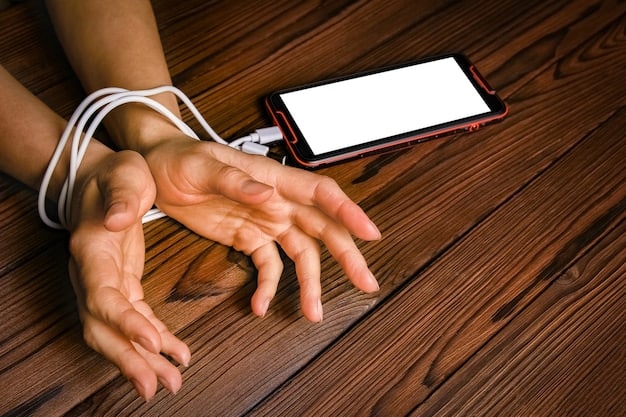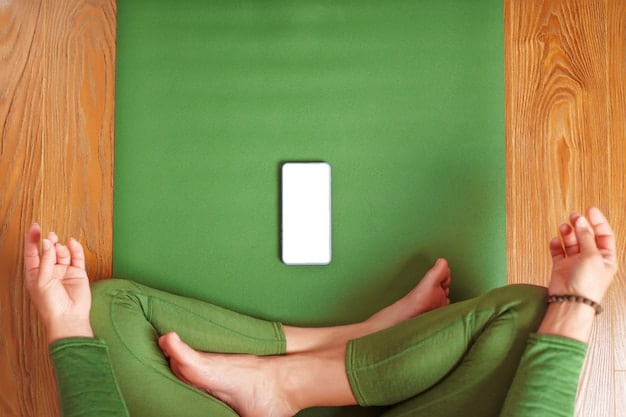Social Media Burnout: 5 Ways to Protect Your Mental Health

Social media burnout is a state of emotional, physical, and mental exhaustion caused by excessive social media use, and this article explores five effective strategies for protecting your mental health in the digital age, including setting boundaries, being mindful of content consumption, and prioritizing real-life connections.
Are you feeling drained, anxious, or overwhelmed by social media? You’re not alone. Social media burnout is real, and it’s essential to protect your mental health in the digital age. Let’s explore five actionable strategies to help you regain control and find balance.
Understanding Social Media Burnout
Social media, while offering connectivity and information, presents a double-edged sword. Prolonged and excessive use can lead to social media burnout which directly affects mental well-being. Knowing what causes this burnout and how it affects you is the first step in taking back control of your digital life.
Understanding burnout, in this context, includes recognizing it as a legitimate and growing concern. It is essential for fostering discussions about the mental health implications of social media and encouraging healthy digital habits.
Defining Social Media Burnout
Social media burnout is a state of emotional, physical, and mental fatigue brought on by excessive and prolonged engagement with social media platforms. It manifests differently in each individual, but there are common symptoms.
- Constant need to check notifications.
- Feeling anxious if you are unable to access your social media.
- Reduced satisfaction in real-life interactions.
- General feelings of dread or anxiety when opening social media apps.
Burnout isn’t just about feeling a bit tired of social media. It’s a deeper state of exhaustion that can impact various aspects of your life, undermining your mental well-being.

Strategy 1: Setting Boundaries with Social Media Use
Setting boundaries can be difficult if social media is used for business purposes; however, clearly defining your personal rules for engagement may reduce the amount of stress you experience. This strategy can help in preventing social media burnout.
One of the most effective ways to combat social media burnout is to consciously set boundaries that respect your time and mental space. By becoming more disciplined with your routine, you may be able to take back control of your day.
Time Limits
Allocate set periods during the day when you engage with social media and stick to these times. Avoid using social media right before sleeping as it can impair your ability to wind down and relax.
Designated Tech-Free Zones
Create spaces where social media is off-limits. This could be the dinner table, your bedroom, or during family time. This allows you to be more present during important moments in your life and reduces the constant allure of social media updates.
By establishing these boundaries, you create essential separation between your digital life and personal space. This minimizes the risk of continual engagement and exhaustion.
Strategy 2: Practicing Mindful Content Consumption
Being mindful of the content you consume on social platforms directly affects your emotional and mental well-being. Mindful content consumption can help prevent social media burnout by limiting the amount of negative and harmful input you receive on a regular basis.
This approach involves being highly selective and aware about engaging with information on social platforms. By consciously choosing what you view and interact with, you protect yourself from negativity and information overload.
Unfollow and Mute
Unfollow accounts and topics that consistently evoke negative feelings. Mute notifications from overwhelming or noisy groups and channels to reduce disruptions.
Be Aware of Your Reactions
Pay attention to how you feel when engaging with particular content. If you notice feelings of anxiety, sadness, or anger, consider limiting your exposure to such content.

Strategy 3: Prioritizing Real-Life Connections
Digital interactions may easily replace in-person ones. By nurturing real-world relationships, you may reduce dependence on social networks and strengthen mental health. This step can help reduce the chances of social media burnout.
Engaging and maintaining face-to-face relationships provides a sense of community and support that online interactions often struggle to provide. By being more present with loved ones, you are prioritizing your own mental well-being.
- Schedule regular meetups with friends and family
- Participate in group activities and hobbies
- Make an effort to be present in conversations
Real-life connections offer validation and emotional support that combat loneliness and isolation, which can be made worse by the often competitive environment of social media.
Strategy 4: Implementing Digital Detox Periods
Scheduled breaks from social media can help in re-centering thoughts and regaining perspective on the impacts of social media on day-to-day life. These breaks allow for personal reflection and can reduce the risk of social media burnout.
Digital detox involves setting specific periods during which you completely disconnect from all digital devices and social media. These breaks provide your mind and body with the opportunity to reset.
Short Daily Breaks
Take short breaks throughout the day to disconnect from your devices. Use this time to do something relaxing, such as going for a walk or reading a book.
Longer Weekend or Vacation Detoxes
Plan weekend or vacation getaways where you minimize or eliminate your use of technology. This extended break allows you to fully immerse yourself in the present environment without the distraction of social media.
Digital detox periods provide a critical break from the constant stream of information and sensory overload, giving you the chance to reconnect with your inner self and the physical world around you.
Strategy 5: Seeking Support and Professional Help
Acknowledging the need for support is a sign of strength, not weakness. Don’t hesitate to tap into your support networks or seek help if you are going beyond social media burnout and experiencing symptoms of depression or anxiety.
Professional help from therapists or counselors may provide you with tools and strategies that help you navigate your digital life in a healthier way.
- Speak to a therapist or counselor
- Join a support group
- Reach out to friends and family
Seeking support can provide you with a safe space to discuss your experiences, gain perspective, and develop coping mechanisms that support your well being.
By learning to identify triggers, setting boundaries, and prioritizing your mental health and well-being, you can enjoy the benefits of social media without sacrificing your peace of mind.
| Key Point | Brief Description |
|---|---|
| ⏰ Set Boundaries | Allocate specific times for social media to avoid constant engagement. |
| 🚫 Mindful Consumption | Be selective about the content you consume to protect from negativity. |
| 🫂 Real Connections | Prioritize face-to-face relationships over digital interactions. |
| 🧘 Digital Detox | Take regular breaks from all digital devices to reset and recharge. |
FAQ
▼
Key signs include feeling overwhelmed, anxious, or irritable when thinking about or using social media. Difficulty sleeping, reduced productivity, and a general sense of disconnection from real life, may also be present.
▼
Set specific time limits for social media use each day and stick to them. Designate tech-free zones, such as the bedroom or dining table, to maintain a balance between digital and real life.
▼
Mindful content consumption helps protect your mental health by reducing exposure to negative or overwhelming information. It involves being selective about what you engage with online.
▼
Digital detox periods provide a critical break from the constant stimulation of social media. Helping to reduce stress, improve sleep, and reconnect with real-life experiences and relationships.
▼
Seek professional help if you experience persistent feelings of anxiety, depression, or disconnection. A therapist can provide tools and strategies for managing your digital life and improving mental well-being.
Conclusion
As you navigate the digital world, remember that your mental health is paramount. By implementing these strategies, you can foster a balanced relationship with social media, ensuring it enhances rather than detracts from your overall well-being.





